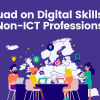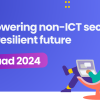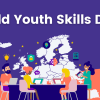Calling all digital skills experts: apply by 2 March via our Open Call for Expression of Interest! [extended deadline]

If you have ever visited the Digital Briefs section of the Digital Skills & Jobs Platform, you would know that it essentially contains deep-dives by different experts on a range of relevant topics, at the very intersection of the biggest trends in digital skills, jobs and technology.
For the 2025 'Digital Briefs' Platform series and via an Open Call for Expression of Interest, we are looking for experts to share their insights on 10 themes at the heart of digital skills, jobs, and technology - and at the intersection of some of the most looming challenges ahead of European society.
What are the 'Digital Briefs' series?
The Digital Briefs series on the Platform are part of a wider effort to offer in-depth, high-quality content on key topics in the field of digital skills and jobs and digital technologies, whilst reflecting the diversity of perspectives that lies at the core of the EU's strengths. Each brief is presented in the form of a deep-dive: a longer article resembling an academic paper and ranging between 2.000 to 3.000 words excluding references, which focuses on a relevant topic around digital skills, jobs and/or technology and adopts a user-friendly style and tone.
Apply by 2 March & share your expertise on 10 available topics!
Help us offer an easy-to-read overview of different technologies and share your views on making the most out of the digital transformation and key digital technologies in a way that benefits society.
For this fourth call for the Digital Skills and Jobs Platform Briefs, we welcome expressions of interest for any of the 10 topics listed below. All topics should be tackled from the prism/perspective of digital skills and jobs. The exact scope and final titles may be elaborated in discussion with the selected expert, and amended as a result.
Topics
- Gaps in EU Regions: examining digital skills challenges and actions to address these across EU
regions (a comparative analysis of the state-of-play in at least 4 EU Member States). - Merging disciplines for knowledge to boost the ratio of women in ICT - how can we get more girls
engaged in ICT by integrating good practices and lessons learnt from across spheres (education,
government affairs, ICT, social sciences, etc). - Digital skills through the prism of inequality: rethinking strategies to tackle emerging and known
silos of discrepancies (rich vs poor, young vs old, male vs female, etc). - ‘Generation Cyber’: developing strategies for cybersecurity skills training and enhancing awareness of cyber threats, with cybercrime on the rise in recent years.
- Green IT and Energy Efficiency: what are some of the ways in which we can reduce the energy and environmental impact of digital technologies and infrastructure (data centres, waste management, blockchain's environmental impact).
- The right to privacy: how far does one's right to privacy extend in a digital world, sped up by the intensifying development pace of AI and other digital technologies? What are some ways hackers can gain access to our accounts, and what may the consequences be?
- What is cryptography and how can it be used to power societal good?
- Unveiling European capacity-building: an overview of strategies to ensure European
competitiveness in innovation in the context of an intensifying global race to pioneer technology. - Digitalising the Fourth Estate: an exploration of the changing role of media as the primary channel for information distribution and the impact on public discourse and opinion.
- Blockchain and the road ahead: an overview of blockchain technology and its potential to transform financial markets, the banking sector, and government processes.
Conditions
The experts selected shall have substantial experience in the topics they apply for, a background including research and analysis activities, and specific experience in writing such materials. They should be based in Europe (EEA) and their context of work should be the European context. A good knowledge of English (the language the papers will be drafted and published), is essential. Experts should be reachable during standard office hours in Europe. The content development work should be delivered between February and June, with the exact timeline confirmed with each expert.
How to apply?
Read the full Call for Expression of Interest for Topic Experts for the Digital Briefs and send your application by Sunday, 2 March 2025. We will close applications at 23.59 CET!





